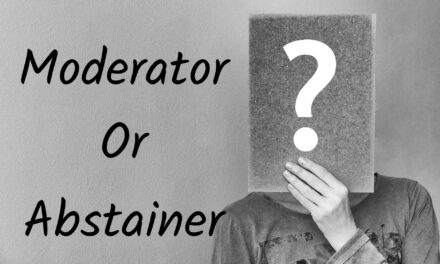7 Tips to Get Through Sugar Withdrawl
I heavily promote the benefits of abstaining from sugar, but anyone who has tried it knows that it can feel like an uphill battle to get there. Going through this process can bring both physical and emotional challenges. Here are seven tips to get you through your sugar withdrawal to help you get to the other side.
Tip 1: Know what things are normal to experience.
Sometimes just knowing what to expect makes it easier to deal with. The following are documented symptoms that I have also experienced personally:
Intense Cravings:
You may have some of the worst sugar cravings you have ever had. This is normal. They will pass. Keep reading to learn tips to manage them.
Headaches:
Some people find that they get headaches when they go off of sugar. Taking an OTC pain reliever, as appropriate for your individual needs, could be helpful.
Depression/Anxiety:
With sugar consumption spiking levels of dopamine, your body is likely going to go through a period of freak out when you take that away. This is a symptom I have experienced when going off of sugar, and it is temporary. It all levels out, and you will soon start feeling good (maybe even better than before!) without the sugar.
Trouble focusing:
As part of the withdrawal, you may find that you have trouble focusing. When going through this, I find myself hyper-focused on whatever sugar I am craving at the moment. This can also be related to disrupting your regular dopamine fix as well.
Low energy:
If you have been dependent on sugar to give you your afternoon jolt of energy, you may find yourself sluggish in the afternoon when you don’t have it.
Your experience will likely not mirror mine – your body is different and your current level of consumption is likely different. As I did not provide an exhaustive list, it can be helpful to research any other symptoms you may be experiencing as well. Sometimes knowing that other people went through the same thing can be really helpful.
To read more about the research being done in this field about sugar withdrawal, here is an informative article from the National Institute of Health.
Tip 2: Eat a healthy diet (protein and fiber)
It is essential to eat a healthy and balanced diet during this time. If you use intermittent fasting, be prepared to put it on pause for a week or two if you find that it makes your cravings worse. Making sure that you never let yourself get too hungry is very important. You don’t want to make your cravings worse by letting yourself get too hungry.
You want to make sure that you are eating a lot of protein, fiber, and “healthy fats” to keep you feeling fuller longer. It will help keep your blood sugar stable and prevent the spikes and drops that may worsen your cravings.
With that being said, I am personally not someone that needs to stop eating flour or other grains to stay abstinent from refined table sugar (sucrose). However, for some people removing flour and highly refined carbohydrates may need to become a part of their abstinence or at least avoid them for a time.
Tip 3: Find a replacement
Something new to keep attention
We definitely don’t want you trading one addiction for another, but now would be a great time to learn something new – knitting, playing an instrument, or maybe even starting a blog. (Who would do that?) Give yourself something new that can keep your hands busy, give you a sense of accomplishment, and give the reward system in your brain some new sources of dopamine.
Swap with foods in line with your goals
There is no one size fits all for what will work, but having food substitutions in mind and on-hand can help a lot. Do you crave your soda? Try flavored seltzer such as LaCroix or Bubly to have instead.
For some people, eating fruit is too triggering. If you can control your fruit intake, I find having the natural sugar (and fiber!) from eating fruit to help with my cravings. Oranges are one of my favorites because of the work it takes to eat one. Other good low-sugar options are blueberries, raspberries, and strawberries.
Be creative, and keep an eye out here for more suggestions in the future!
Tip 4: Keep Up Your Self-Care
Taking care of yourself through periods of withdrawal is very important. We want to make sure you are functioning optimally, both mentally and physically.
Sleep
As you may remember from my article about stopping sugar cravings before they start, getting enough sleep is very important to keep the cravings at bay. It will also help you get through the period of withdrawal. When we don’t get enough sleep, our body craves more sugar for that quick burst of energy. Additionally, when we are well-rested, we tend to make more clear-headed choices and are more likely to stick to our long-term goals.
Journal about your feelings
Regardless of any physical symptoms you may have, chances are, you will have a lot of feelings come up. Many people use sugar to help them with difficult situations in life, and now you’re taking that away.
You may also have feelings of fear regarding even with just experimenting what a life without refined sugar would look like. It is essential to process and work through those feelings, and journaling is a great way to do that.
Social Support
“I get by with a little help from my friends” is more than just a line from a Beatles’ song, it is a key to your success in this potentially difficult period of transition.
Start with the people you live with. Do you live with a spouse or partner? Roommates? Your children? When I first quit sugar cold turkey, I was very fortunate to have amazing roommates that were 100% supportive. I told them what my goals were, and they were happy to help.
It is also critical to have people you can call or message when you’re struggling. You could start this journey with a friend who has similar goals. Maybe you join a 12 step group such as Overeaters Anonymous to meet people with similar struggles. Perhaps you join a Facebook group that connects you to other people with a common goal. Find those people.
Sometimes the people in our lives aren’t supportive. This unfortunately happens. A common reason is that the person is afraid of you changing. The person may also fear how your changes will affect them. (Who will they get ice cream with now?) Some people may not understand why it is important to you or may have a different philosophy regarding healthy eating. (Are they a moderator?) It could also be rooted in jealously. People are complicated, and it may not be one of those reasons at all.
Having unsupportive friends and family can be tricky (and will be its own blog post!), but a lot of that can be made better by communicating, setting boundaries, and finding people that will support you.
Tip 5: Stay Focused
When we get excited about changing our life and adopting healthy habits, it can be easy to want to change “all the things” from the get-go. It is fantastic that you want to overhaul your life for the better, but let me be clear- cutting out refined sugar and going through sugar withdrawal should be your only focus for at least a few weeks.
You will be taxed enough by trying to make this change, and trying to take on the world right now is unwise. In many ways, by cutting out refined sugar, you are already taking on the world. It’s great to maintain healthy habits you already have, but please don’t try to add going to the gym every day at the same time if you can’t remember the last time you went.
Tip 6: Know Your Why
The reason you decided to stop eating sugar is so important and should be at the forefront of your mind. Post it on your mirror. Write it out every day. Whatever your reason – improved health, achieving and maintaining a healthy weight, having more control over what you eat, or perhaps it is something else entirely. Know what that is, and keep it in the forefront of your mind.
Tip 7: Remember This is Very Temporary
Going through the withdrawal period from stopping refined sugar is a temporary and short-term experience. The worst will likely be over in a few days – a couple weeks max. After 30 days, you will feel much better, and assuming you have cut out your triggers, your physical cravings should have stopped by now.
The benefits, however, stick around for the long term. Breaking free from the hamster wheel of refined sugar has given me more brain space to focus on what matters. It makes eating healthier and achieving and maintaining a healthy weight so much easier. I also just feel better. You are strong. This is temporary. And the rewards will keep on giving.






